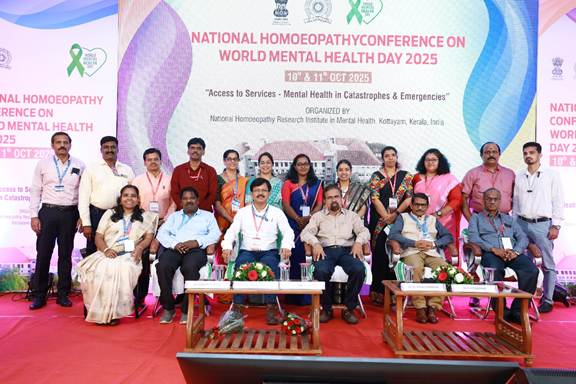National Homoeopathy Conference Highlights Mental Health Care in Disasters and Emergencies
The conference began with an inaugural session that set the tone for two days of intensive academic exchange and research-oriented dialogue.

- Country:
- India
In observance of World Mental Health Day 2025, the National Homoeopathy Research Institute in Mental Health (NHRIMH), Kottayam, organized a two-day National Homoeopathy Conference from 10–11 October 2025 at the NHRIMH Auditorium. The conference, themed "Access to Services – Mental Health in Catastrophes and Emergencies", brought together a distinguished group of researchers, clinicians, academicians, and public health experts from across India to discuss the evolving role of Homoeopathy in mental health care, particularly in crisis and disaster contexts.
Hosted under the aegis of the Central Council for Research in Homoeopathy (CCRH), Ministry of AYUSH, the event focused on the growing significance of integrative and evidence-based approaches to mental health services and emphasized the potential of Homoeopathy in post-disaster rehabilitation, community resilience, and accessible psychosocial care.
A Platform for Integrative Mental Health Dialogue
The conference began with an inaugural session that set the tone for two days of intensive academic exchange and research-oriented dialogue. The event was graced by Dr. C. T. Aravind Kumar, Vice Chancellor of Mahatma Gandhi University, Kottayam, who inaugurated the conference. In his address, Dr. Aravind Kumar highlighted the pressing need for holistic and person-centered mental health support systems, particularly during humanitarian crises and emergencies.
He stressed that mental health must be treated as a core component of disaster response frameworks, and encouraged deeper collaborations between modern psychiatry, Homoeopathy, and community mental health programs to ensure accessibility and continuity of care during and after disasters.
Emphasis on Integration and Research
Dr. Subhash Kaushik, Director General of CCRH, New Delhi, addressed the gathering virtually and emphasized the importance of scientific validation and research integration in Homoeopathy's expanding role within mental health care. He noted that Homoeopathy, when combined with psychosocial interventions, can significantly enhance rehabilitation outcomes for populations affected by trauma, displacement, or disaster-induced stress.
"Integrating Homoeopathy into psychosocial care frameworks based on strong evidence can transform the way we address mental health challenges in disaster contexts. Our goal should be to empower communities through accessible, culturally relevant, and scientifically grounded care," Dr. Kaushik said.
Shri Chetan Kumar Meena, IAS, District Collector of Kottayam, attended as Guest of Honour and lauded NHRIMH's efforts in promoting integrative mental health research. He noted that the inclusion of Homoeopathy in disaster response mechanisms could expand mental health accessibility in rural and underserved regions, ensuring timely support to affected populations.
Dr. Debadatta Nayak, Assistant Director (H) and Officer-in-Charge, NHRIMH, delivered the welcome address, emphasizing the global relevance of the conference theme. He underlined the urgent need to bridge the treatment gap in mental health services during emergencies through community-based models that include Homoeopathy.
Dr. R. Sitharthan, Principal, NHRIMH, proposed the vote of thanks, acknowledging the contributions of the organizing team, speakers, and participants who made the event a platform for interdisciplinary collaboration.
Scientific Sessions: Bridging Evidence and Practice
The conference featured a rich array of scientific sessions, blending clinical evidence, field experience, and theoretical perspectives.
On Day One, sessions explored diverse topics, including:
-
Disaster Mental Health: Lived Experience and Emerging Trends
-
Psychiatric Crisis in Hydrological Disasters: Community-Based Management in Wayanad, Kerala
-
Homoeopathic Approaches in Disaster Management
-
Resilience in Crisis Situations
-
N-of-1 Trials and Translational Networks in Homoeopathy
-
Emotional Dysregulation in ADHD and Its Homoeopathic Treatment
These discussions highlighted how individualized homoeopathic interventions can complement conventional mental health services and provide psychological support in post-trauma scenarios, particularly where modern infrastructure is unavailable.
On Day Two, the focus shifted toward research methodologies, clinical assessments, and case-based learning. Key sessions covered:
-
Methodological Frameworks in Mental Health Research
-
Clinical and Laboratory-Based Mental Health Assessments
-
Human Response to Trauma and Psychiatric Emergencies
-
Case-based insights into PTSD, ADHD, Autism Spectrum Disorder, Psychotic Disorders, and Substance Withdrawal
Participants also discussed emerging data on N-of-1 trials, a powerful research model that aligns with the personalized nature of Homoeopathy.
Student Research and Academic Participation
Postgraduate trainees from NHRIMH showcased their dissertation research covering an impressive range of mental health conditions such as:
-
Bipolar Disorder
-
Schizophrenia
-
Major Depressive Disorder
-
Obsessive-Compulsive Disorder (OCD)
-
Internet Addiction
-
Alcohol and Cannabis Use Disorders
-
Autism Spectrum Disorder
-
Parkinson's Disease
Their presentations reflected a growing emphasis on evidence-based research, biopsychosocial understanding, and clinical innovation within the Homoeopathic framework.
Expert Perspectives and Special Addresses
Dr. K. C. Muraleedharan, Assistant Director (H) and Admin In-Charge, CCRH, delivered a special address emphasizing Homoeopathy's evolving role in community-based mental health care. He underscored the necessity of interdisciplinary collaboration among psychiatrists, psychologists, public health professionals, and Homoeopaths to create inclusive care systems that address both acute psychiatric symptoms and long-term recovery.
Experts at the conference called for strengthening research infrastructure, capacity building, and policy-level integration of Homoeopathy within India's national mental health programs, particularly under AYUSH and National Health Mission (NHM) frameworks.
Valedictory Session and Takeaways
The conference concluded with a valedictory session, during which participants expressed appreciation for the opportunity to engage in interdisciplinary discussions on the integration of Homoeopathy in mental health care.
The event reaffirmed the urgent need for accessible, community-centered, and evidence-backed interventions in managing mental health crises, especially in disaster and emergency situations.
In his closing remarks, Dr. Sitharthan reiterated that the conference served as a milestone in advancing Homoeopathy's contribution to mental health, promoting research collaboration, and building a stronger foundation for integrative care.
Toward an Integrative Mental Health Future
The National Homoeopathy Conference 2025 underscored the growing global recognition of Homoeopathy as a complementary component in psychosocial and disaster mental health frameworks. It called for continued research, innovation, and policy support to ensure equitable mental health care access across India.
By uniting practitioners, researchers, and policy experts, the event reaffirmed India's leadership in promoting holistic, affordable, and culturally sensitive mental health systems aligned with the vision of "Health for All."









